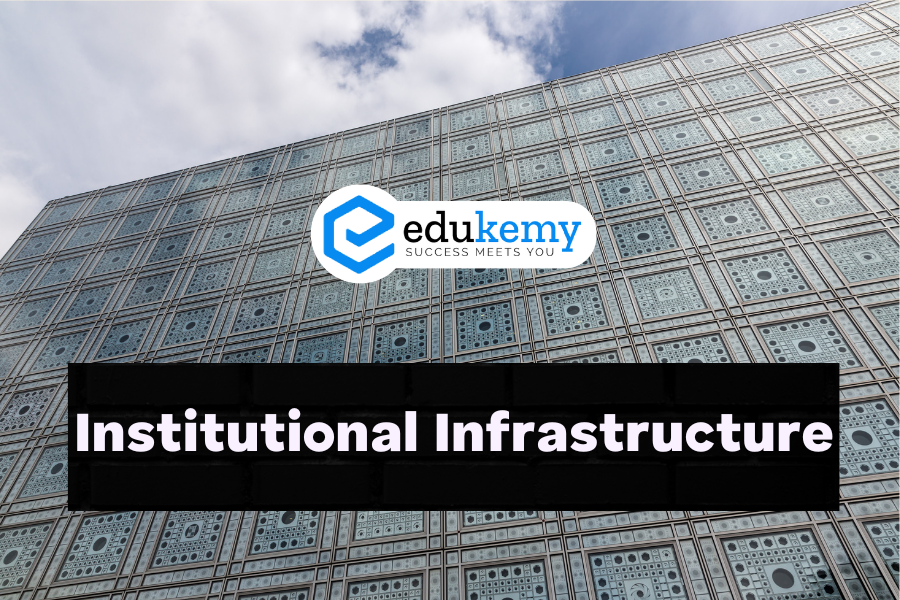
Institutional infrastructure forms the backbone of societies, providing the framework within which economic, political, and social interactions occur. It encompasses the array of organizations, regulations, and systems that facilitate the functioning of communities, businesses, and governments. From financial institutions and legal frameworks to educational systems and healthcare networks, institutional infrastructure shapes the stability, efficiency, and development trajectory of nations. These structures not only establish norms and rules but also influence the distribution of resources, opportunities, and power within a society. Understanding and enhancing institutional infrastructure are crucial endeavors for fostering economic growth, social cohesion, and overall progress on both local and global scales.
Contents
Institutional Infrastructure for Trade Facilitation in India
- Board of Trade (BOT):
- Establishment: Set up in 1989.
- Purpose: Maintains continuous dialogue with trade and industry on international trade developments.
- Chair: Union Commerce Minister.
- Roles: Advises the government on Foreign Trade Policy, works towards boosting exports, meets quarterly.
- Inter State Trade Council:
- Establishment: Formed in 2005.
- Purpose: Ensures continuous dialogue with state governments and union territories.
- Chair: Union Commerce & Industry Minister.
- Representation: Chief ministers of states, state cabinet ministers, Lt. governors, or administrators of union territories.
- Export Promotion Councils:
- Control: Generally under the Department of Commerce; textile-related councils under the Ministry of Textiles.
- Legal Status: Registered as non-profit organizations under the Companies Act/Societies Registration Act.
- Functions: Advisory and executive roles, serve as registering authorities.
- Relevance: Significant in the context of globalization and economic liberalization.
- Examples:
- Apparel Export Promotion Council
- Chemicals Pharmaceuticals and Cosmetics Export Promotion Council (CHEMEXCIL)
- Carpet Export Promotion Council
- Cashew Export Promotion Council of India
- Cotton Textile Export Promotion Council
- Electronic and Computer Software Export Promotion Council
- Engineering Export Promotion Council, and more.
Conclusion: India’s institutional infrastructure for trade facilitation includes bodies like the Board of Trade, Inter State Trade Council, and Export Promotion Councils. These entities play vital roles in advising the government, ensuring state-level cooperation, and actively promoting and facilitating exports across various sectors. The collaboration between these institutions is essential for creating a conducive environment for international trade and enhancing India’s global competitiveness.
Commodity Boards and Export Promotion Entities in India
- Statutory Commodity Boards:
- Responsibility: Production, development, and export promotion of tea, coffee, rubber, spices, and tobacco.
- Examples: Boards for tea, coffee, rubber, spices, and tobacco.
- Agricultural and Processed Food Products Export Development Authority (APEDA):
- Established: 1986.
- Objective: Facilitates agricultural exports, including processed foods in value-added form.
- Authority: Empowered to file for Geographical Indications for agricultural products.
- Marine Products Export Development Authority (MPEDA):
- Established: Under MPEDA Act, 1972.
- Role: Development of the marine products industry, with a focus on exports.
- Headquarters: Kochi.
- Export-Import Bank of India (Ex-Im Bank):
- Established: 1981.
- Nature: Public sector financial institution.
- Objective: Finances Indian exports.
- Services: Offers a comprehensive range of financial products and services to support export-related companies.
- Export Credit Guarantee Corporation of India Ltd. (ECGC):
- Objective: Promotes exports by covering the risk of export on credit.
- Services: Provides insurance covers to Indian exporters against the risk of non-realization of export proceeds due to commercial or political causes.
Conclusion: India has various entities dedicated to promoting and facilitating exports, including Commodity Boards for specific products, authorities like APEDA and MPEDA for agricultural and marine products, and financial institutions like Ex-Im Bank and ECGC to support export-related businesses. This multifaceted approach reflects the government’s commitment to fostering a conducive environment for the growth of India’s export sector across diverse industries.
FAQs
1. What is institutional infrastructure?
Institutional infrastructure refers to the framework of organizations, policies, regulations, and systems that support the functioning of a society or economy. It encompasses government agencies, financial institutions, legal frameworks, and other entities that facilitate social, economic, and political activities.
2. Why is institutional infrastructure important?
Institutional infrastructure is crucial for fostering economic development, promoting social stability, and ensuring effective governance. It provides the necessary framework for businesses to operate, investors to invest, and individuals to engage in various activities with confidence and security.
3. What are some examples of institutional infrastructure?
Examples of institutional infrastructure include central banks, regulatory bodies (e.g., securities commissions, environmental agencies), legal systems (including courts and enforcement mechanisms), public utilities (such as water and electricity providers), educational institutions, and healthcare systems.
4. How does institutional infrastructure impact economic growth?
A robust institutional infrastructure fosters economic growth by providing a stable environment for investment, promoting competition and innovation, ensuring property rights protection, and reducing transaction costs. Effective institutions also enhance trust between individuals and organizations, facilitating economic transactions and cooperation.
5. Can institutional infrastructure vary across countries?
Yes, institutional infrastructure can vary significantly across countries due to differences in historical, cultural, political, and economic contexts. Some countries may have well-established institutions that promote economic development and stability, while others may struggle with corruption, inefficiency, and inadequate regulatory frameworks. Addressing institutional weaknesses is often a key focus for policymakers seeking to improve overall governance and economic performance.
In case you still have your doubts, contact us on 9811333901.
For UPSC Prelims Resources, Click here
For Daily Updates and Study Material:
Join our Telegram Channel – Edukemy for IAS
- 1. Learn through Videos – here
- 2. Be Exam Ready by Practicing Daily MCQs – here
- 3. Daily Newsletter – Get all your Current Affairs Covered – here
- 4. Mains Answer Writing Practice – here

